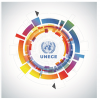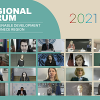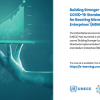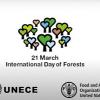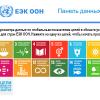Press Releases
Displaying Results 301 - 325 of 375
The United Nations Economic Commission for Europe (UNECE) and the Norman Foster Foundation signed a Memorandum of Understanding (MoU) on 23 March 2021.
The two organisations formalise their cooperation in the promotion of sustainable housing and sustainable cities through the establishment of the
A UNECE-led partnership will improve energy efficiency of the global building supply chain and its products to deliver high performance buildings in seven UNECE member States: Armenia, Georgia, Kyrgyzstan, Republic of Moldova, Tajikistan, Ukraine, and Uzbekistan.
The launch of the project was
The extraction of raw materials worldwide has more than doubled since 1990 and could double again by 2060, fuelling environmental degradation and increased vulnerability to climate change. As major users and producers of natural resources, 56 countries of the UNECE region, spanning from North
The use of material resources, fuelled by economic and population growth, urbanisation and societal changes, has increased more than ten times since 1900 and is set to double again by 2030. The annual global extraction of materials has increased from 27 to 92 billion tonnes since 1970, while the
Localizing the Sustainable Development Goals at the urban level is crucial to deliver on the 2030 Agenda, stresses UNECE in a new report that advocates for a “cities-based” and “people-smart” approach to sustainable development.
With cities today as the driving force in economic, social,
More robust monitoring and measuring systems are required to meet the Sustainable Development Goals (SDGs), according to a UNECE report on Measuring and Monitoring progress towards SDGs that uses a “nexus” approach to chart a course for more “joined up” activities.
High-quality statistics
Recognizing the vital importance of mobility and connectivity for sustainable economic development and taking stock of key challenges, UNECE has consolidated its work in this cross-cutting area to help countries leverage its tools to steer recovery efforts towards the Sustainable Development Goals
Countries of the Pan-European region can seize the COVID-19 recovery as a turning point for green and healthy transport and mobility as a foundation to build a better future for all, urges a UN Task Force.
Bringing together over 50 experts from member States, international institutions, academia
Countries in the eastern UNECE region can play a leading role in CO2 storage, according to new study
Countries of Eastern Europe, the Caucasus and Central Asia host significant potential for CO2 storage. Using publicly available data, the analysis by geological experts identifies for the first time storage potential in oil reservoirs in excess of 62,000 million tonnes (Mt) of CO2 in the eastern
How can the Sustainable Development Goals (SDGs) guide us to recover better? At the 2021 Regional Forum, more than 1,400 key stakeholders connected virtually during 7 days of action for the Sustainable Development Goals (SDGs). From 10-18 March 2021, changemakers from all parts of the UNECE region
According to the most recent Forest Resources Assessment report published by the Food and Agriculture Organization of the United Nations (FRA2020), the UNECE region has been one of few regions where forest area has increased over the last three decades, up by 33.5 million hectares. This puts
Every crisis contains the seeds of opportunity and growth, and the COVID-19 pandemic is no different. International standards provide powerful tools for bolstering economic resilience, while enabling enterprises to improve their productive capacity. Given their extensive coverage of production
For most of early history, humans obtained their food by hunting and collecting wild plants in grasslands and forests. Nowadays, the conversion of forest land to land for agriculture is the single largest driver of deforestation worldwide, contributing to climate change and biodiversity loss on an
UNECE’s Dashboard for SDGs is now available in Russian, broadening the spectrum of constituents from across the region who can now access it with ease. The dashboard, launched in English in 2020, brings together available data for the 56 UNECE member States to provide a regional perspective on the
Cities are growing fast. Half the world’s population already lives in urban areas and another 2.5 billion are expected to be living in cities by 2050. In 2015, the international community set the goal of making cities “inclusive, safe, resilient and sustainable” by 2030 (Sustainable Development
The Guidelines launched today by UNECE call for the development of a Strategic Framework for Mainstreaming Ageing to ensure its systematic consideration and integration in public policies.
By 2050, about one in every four persons in the UNECE region will be over the age of 65. Population ageing
If the UNECE region follows current trends, by 2030 it will achieve only 23 of the 169 SDG targets. However, only 89 targets can be assessed while for the remaining 80, no assessment can be made due to insufficient data.
For 57 targets, progress needs to accelerate if we are to achieve the targets
The legal provisions providing the legal basis for the complete digitalization of the United Nations TIR Convention (the so-called eTIR) - the only global customs transit system, facilitating trade and the seamless and secure movement of goods across borders –will enter into force on 25 May 2021
Recent trends suggest that the forest sector workforce across the UNECE region is facing considerable challenges. These include an ageing workforce, underrepresentation of women and minorities, as well as declining job opportunities as a result of increased mechanization, reorganization of forestry
Across the world, 153 countries share rivers, lakes and aquifers. Transboundary basins cover more than half of the Earth’s land surface, account for an estimated 60 per cent of global freshwater flow and are home to more than 40 per cent of the world’s population. Transboundary water cooperation is
UNECE and LIUC – Cattaneo University have agreed to establish a Geneva UN Charter Centre of Excellence to advance sustainable finance for infrastructure and smart cities. Against the backdrop of the COVID-19 pandemic, UNECE joins forces with an expert institution in sustainable finance to support
A new report from the United Nations warns that time is running out to deliver on the Paris Agreement and the 2030 Agenda for Sustainable Development and calls for rapid deployment of carbon capture use and storage (CCUS) to meet carbon neutrality targets.
Carbon capture use and storage (CCUS) is
Did you know that over 80 per cent of immigrants leave Switzerland again within 17 years of their arrival? Or that in In Italy, 15 per cent of immigrants from China move at least twice within the country in the five years following their entry?
These are some of the examples of use of
With fish production estimated to reach 204 million tonnes in 2030, illegal, unreported and unregulated (IUU) fishing costs up to $23 billion every year to countries and affects one in every five fish caught. UNECE member states face these issues both on the high seas and in areas within national
Intelligent Transport Systems can unlock major benefits in terms of safety, efficiency and environmental performance for mobility and the movement of goods. But with the rapid pace of innovation, ensuring interoperability and harmonization of technological solutions between countries remains a key




